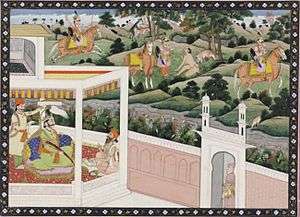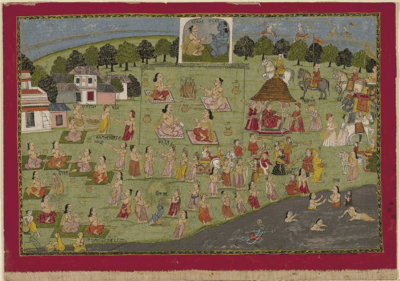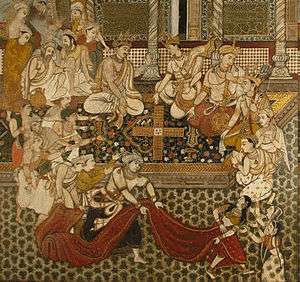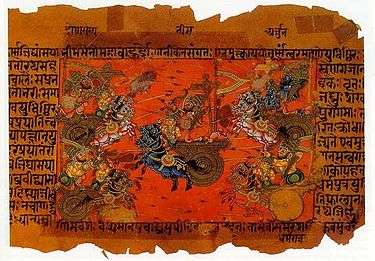Yudhishthira
| Yudhishthira | |
|---|---|
 Yudhishthira on the throne with Draupadi, surrounded by the other Pandavas | |
| Predecessor | Dhritarashtra |
| Successor | Parikshit |
| Spouse(s) | Draupadi, Devika |
| Children | Prativindya, Yaudheya (sons) |
| Parent(s) | |
In the Hindu epic Mahabharata,Yudhishthira (Sanskrit: युधिष्ठिर, yudhiṣṭhira) was the eldest son of King Pandu and Queen Kunti and the king of Indraprastha and later of Hastinapura (Kuru). He was the leader of the successful Pandava side in the Kurukshetra War. At the end of the epic, he ascended to heaven.
By the description of Vyasa and Krishna, the king was fair and lotus-eyed, with a long and stout nose, tall and strong but humble like any other citizen.
Etymology
The word Yudhishthira means "the one who is steady in the war", from the words, yuddha (युद्ध) meaning 'war', and sthira (स्थिर) meaning 'steady'. His other names are-
- Bharata vanshi (भारत vanshi) - descendant of Bharata (emperor) [1]
- Ajatashatru (अजातशत्रु) - one without enemies [2]
- Dharmaraja (धर्मराज) - owner or king of righteousness or king of Dharma
Birth and upbringing

Once a Brahmin rishi, Kindama and his wife were making love in the forest when Yudhishthira's father Pandu accidentally shot at them, mistaking them for deer. Before dying, Kindama cursed the king to die when he engages in intercourse with any woman. Due to this curse, Pandu was unable to father children. As an additional penance for the murder, Pandu abdicated the throne of Hastinapura, and his blind brother Dhritarashtra took over the reins of the kingdom.[3]
After Pandu's disability, Yudhishthira was conceived in an unusual way. His mother, Queen Kunti, had in her youth been granted the power to invoke the Devas by Rishi Durvasa. Each Deva, when invoked, would bless her with a child. Urged by Pandu to use her boons, Kunti gave birth to Yudhishthira by invoking the Lord of Judgement, Dharma(also known as Yama). Being Pandu's eldest son, Yudhishthira was the rightful heir to the throne, but this claim was contested by the Dhritarashtra's son, Duryodhana. It has been claimed by the astronomers researching on Indian system of astrology that he was born at near about 3154 BC as the legend says on a full moon of Jyeshtha (month), the second month on Indian calendar (according to current systems, falls between mid May to mid June. His zodiac sign was Scorpio and zodiac moment was Leo according to Indian system of zodiac.)
As the child was born the sages and the deities predicted that he would be the most virtuous, honest and truthful king of all times.
Yudhishthira's four younger brothers were Bhima, (born by invoking Vayu); Arjuna, (born by invoking Indra); and the twins Nakula and Sahadeva, (born to Pandu's second wife Madri by invoking the Ashwini Gods). If Karna, the son of Kunti born before her marriage by invoking Surya is counted, Yudhishthira would be the second-eldest of Kunti's children.
Yudhishthira was trained in religion, science, administration and military arts by the Kuru preceptors, Kripa and Drona. Specifically, he became a master in using the spear and war chariot. It is said that his spear was so strong that it could penetrate a stone wall as though it were a piece of paper. His chariot always flew at a 4 finger distance above the ground due to his piety.[4]
Marriage and children
After the Lakshyagriha episode, the Pandavas disguised as brahmins went to the kingdom of Panchala. Here, they attended the Swayamwara of Draupadi, who was the princess of Panchala and the daughter of King Drupada. Arjuna, the younger brother of Yudhishthira, participated in her swayamwara and succeeded in winning her hand in marriage. After the swayamvara, Arjuna along with his brothers, treaded towards the hut where their mother Kunti was waiting for them. As soon as they reached the hut, Arjuna called his mother in delight and said, “Look what we have got as alms”. Kunti who was praying at that moment, without looking what exactly it was, commanded “Whatever Arjuna has received as alms should be equally distributed amongst the five brothers.” Hence Draupadi was married off to all the five brothers, making her the common wife of the Pandavas. Draupadi also became the chief queen-consort of Yudhishthira upon his coronation as the King. Draupadi bore Yudhishthira a son named Prativindhya. Prativindhya was killed by Aswatthama as a revenge for his father Drona's death at the end of the Kurukshetra war. Another wife of Yudhishthira was Devika, the daughter of Govasana of the Saivya tribe, who bore him a son named Yaudheya.

Indraprastha
Performing the Rajasuya

After the coronation at Indraprastha, Yudhishthira set out to perform the Rajasuya yagna to become the "Emperor of the World". His motives were not to obtain power for himself, but to establish dharma and defend religion all over the world.
Arjuna, Bhima, Nakula, and Sahadeva led armies across the four corners of the world to obtain tributes from all kingdoms for Yudhishthira's sacrifice. The non-compliant Magadha king, Jarasandha was defeated by Bhima and Krishna. At his sacrifice, Yudhishthira chose Krishna as his honoured guest.
Losing Kingdom & Exile
Yudhishthira succumbed to Shakuni's challenge in the Pachisi(game of dice). He lost his kingdom, his brothers and Draupadi. While playing for second time, he lost all his kingdom in the game and was forced into exile for 13 years, which included one year in anonymity.
During their exile, the four other Pandavas happened upon a lake, which was haunted by a Yaksha. The Yaksha challenged the brothers to answer his moral questions before drinking the water; the four Pandavas laughed and drank the water anyway. As a result, they choked on the water and died. Yudhishthira went in last, answered many questions put forth to him by the Yaksha and revived his brothers. This story is often cited as an example of Yudhishthira's upright principles.[5] The Yaksha later identified himself as Yudhishthira's father, Dharma and pointed them to the kingdom of Matsya to spend their last year in exile anonymously.
Along with his brothers, Yudhishthira spent his last year of exile in the kingdom of Matsya. He disguised himself as a Brahmin named Kank(within themselves Pandavas called him Jaya) and taught the game of dice to the king.[6] While in the last month of their Agyatvas, the Kauravas attacked Matsya. The helpless son of Virata, Uttar, was assisted and protected by Brihannala(in disguise Arjun) in the fight. Later when Virata's kingdom emerged victorious, Virata boasted about his son to Yudhishthira during a dice game between them. Yudhishthira knew the truth and tried his best to convince the king that the whole fight was fought by Brihannala. The king in a rage threw the dice on Yudhishthira's face. His nose bled and the maid present there(in disguise Draupadi) quickly rushed to Yudhishthira with some water in a bowl so that his blood did not fall to the floor. The king was informed that Uttar and Brihannala were coming back and he gladly invited them. However Yudhishthira silently ordered the soldier not to let Brihannala in as he knew that if Arjuna saw his own brother hurt, he would destroy the entire race of Virata. Uttar comes and sees Yudhishthira in this state. He rushes to tell his father to plead to Kank for forgiveness as if someone makes his blood fall because of no fault of his own then he being the pious son of Dharma could destroy their family completely. After Virata came to know their real identity, Yudhishthira readily told him that he had forgiven him long ago and they thanked Virata for his kindness.
Return To Indraprastha & Kurukshetra War
When the period of exile was completed, Duryodhana refused to return Yudhishthira's kingdom. Yudhishthira made numerous diplomatic efforts to retrieve his kingdom peacefully but in vain. He was convinced by Krishna to wage war.
The flag of Yudhishthira's chariot bore the image of a golden moon with planets around it. Two large and beautiful kettle-drums, called Nanda and Upananda, were tied to it.[7][8][9]
Yudhishthira had to bend numerous rules of Dharma during the course of the war. Krishna made him trick Drona about the news of the death of Ashwathama. Yudhishthira also had to slay a number of warriors, including his own uncle, Shalya.
Duel with Drona and Duryodhana
When Drona became the commander of the Kaurava army, his main objective was to capture Yudhishthira. But Arjuna guarded his brother ferociously. On the fourteenth night however, Drona challenged Yudhishthira to a duel. Drona showers numerous weapons on him, but Yudhishthira calmly countered them and successfully drove off his preceptor. Eager to continue the duel, Yudhishthira is about to chase the guru but is stopped by Krishna, who recognized Drona's feint.
On the fifteenth day, Drona launched a furious attack on the Pandava army when Arjuna was distracted. Yudhishthira led a counterattack with his brothers and managed to wound Drona grievously.
Yudhishthira and Duryodhana engaged themselves in a duel on the 16th day of the war. However, with his level headed demeanour, Yudhishthira overpowers his cousin. With four sharp arrows, he kills Duryodhana's horses, with a fifth, his charioteer, with a sixth, knocks off his diadem, a seventh, breaks his bow and with an eight his sword. He cuts off his banner with a spear but spares his life as he was weaponless.
Killing Of Shalya
Shalya was the brother of Madri and thus a maternal uncle of the Pandavas. He was tricked into joining the Kauravas. Yudhishthira however managed to extract a vow from him that he will constantly demoralize Karna when he becomes his charioteer for the duel with Arjuna. Krishna said that since Shalya was a warrior with a calm demeanour none but Yudhishthira would be able to match him in a duel.
On the eighteenth day Krishna reminds Yudhishthira of his vow. A usually mild Yudhishthira was transformed into a ferocious fighter as he used his bow to break through the Kaurava ranks in search of Shalya. With his expertise in using the war chariot, he destroyed Shalya's many times, but he kept coming back on another one. In a desperate attempt, Shalya rushed towards him on foot but Yudhishthira hurled his spear towards Shalya, killing him.
At the end of the war, Yudhishthira performed the Ashwamedha Yagna and crowned himself as the Emperor of Hastinapura.
After the war
After the end of the great war Ashwatthama, the son of guru Drona avenged his father's unethical death. At the night of 18th day of Kurukshetra war, with the blessing of Lord Shiva, Ashwatthama killed everyone of the Pandava army including the sons of Pandavas. Only the 5 Pandavas, Krishna and Satyaki were the remaining survivors of the great war after this incident. Hearing the news of these events in the morning Yudhishthira fainted and the Pandavas become inconsolable.
The Pandavas including Yudhishthira hunted Ashwatthama to Vyasa's hermitage. After a standoff, they managed to acquire the jewel from Ashwatthama's head, somewhat avenging his acts.
Retirement and Ascent to Heaven

Upon the onset of the Kali yuga and the departure of Krishna, Yudhishthira and his brothers retired, leaving the throne to their only descendant to survive the war of Kurukshetra, Arjuna's grandson, Parikshit. Giving up all their belongings and ties, the Pandavas, accompanied by a dog, made their final journey of pilgrimage to the Himalayas.
While climbing the peaks, Draupadi and four of the Pandavas fell to their deaths, dragged down by the weight of their guilt for their sins. As it happens, Yudhishthira had to answer every time Bhima asked him the reason for his wife and brothers' fall. But he did not even look back to help any of them which seemed very cruel to Bhima. This was because Yudhishthira knew that the time to leave Earthly ties had come and he needed to focus his mind. Yudhishthira was the only one to reach the mountain peak in his mortal body, because he was unblemished by sin or untruth.
On reaching the top, Indra asked him to abandon the dog before entering the Heaven. But Yudhishthira refused to do so, citing the dog's unflinching loyalty as a reason. It turned out that the dog was his god-father Dharma in disguise.[10] The incident symbolized that dharma follows you till the end.
Test of patience in Hell

On reaching heaven, Yudhishthira did not find either his virtuous brothers or his wife Draupadi. Instead, he only saw Duryodhana and his allies. The Gods told him that his brothers were in Naraka (hell), atoning for their sins.
Yudhishthira loyally went to Naraka to meet his brothers, but the sight of gore and blood horrified him. After hearing the voices of his beloved brothers and Draupadi calling out to him, asking him to stay with them in their misery, he remained. Yudhishthira ordered the divine charioteer to return. He preferred to live in hell with good people than in a heaven with his enemies. Eventually this turned out to be another illusion to test him and also to enable him to atone for his sin of deceiving his guru during the war where he half-lied to Drona about Ashwatthama's death. Thereafter, Indra and Krishna appeared before him and told him that his brothers(including Karna) were already in heaven but so were his enemies.
Virtues of Yudhishthira
Son of Dharma

Yudhishthira's true prowess was shown in his unflinching adherence to Satya and Dharma, which were more precious to him than royal ambitions, material pursuits and family relations. Yudhishthira rescued Bhima from Nahusha. He also rescued his four brothers from Yaksha by exemplifying not only his immense knowledge of Dharma, but also understanding its finer implications.
Yudhishthira's understanding of Dharma was distinct from that of other righteous kings. He married Draupadi along with his four brothers, he had Bhima marry an outcast Rakshasi, he denounced casteism, saying a Brahmin is known by his actions and not his birth or education, thus portraying a changeable Dharma.
Due to his piety, Yudhishthira's chariot did not touch the ground (until his deception to Drona), to symbolize his purity. This means he was well regarded as a wise and pious man even by his enemies. In some versions of the story, Yudhishthira's chariot touches the ground due to his deception to Drona. In other versions, his chariot touches the ground because he doesn't lie; he hedges and speaks the truth in a lower tone. He is then punished because he put his own ego (desire to always be known as a truth-teller) over the greater Dharma of winning the war.
Yudhishthira was criticized by Draupadi and Bhima for succumbing to temptation and playing dice, an art he was absolutely unskilled at, making the Pandavas prey to Shakuni and Duryodhana's designs. Yudhishthira reproached himself for weakness of mind, but at the time he argued that it was impossible to refuse a challenge of any nature, as he was a Kshatriya and obliged to stand by the Kshatriya code of honour.
He was a deserving person and became the king after Duryodhana's death. This symbolises the victory of dharma over evil.
Yudhishthira's curse
After he was made aware that Karna was his elder brother, Yudhishthira cursed all women with not being able to hide any secrets. Had Yudhishthira's mother Kunti not kept that fact a secret, the war might have been averted, with millions spared.[11]
Skills
Despite being the eldest Pandava, Yudhishthira had relatively poor fighting skills, possessed by peaceful qualities; passive-hearted and soft-spoken. Still, he was said to be very good at spear-fighting and at chariot racing. Yudhishthira was a polyglot, knowing unusual languages. He was known for his honesty, justice, sagacity, tolerance, good behaviour, and discernment.[12] He understood politics and imbibed all the duties of king from Bhishma. During his twelve-year exile, Yudhishthira learnt to magically control dice from the sage Brihadashwa.
In the media
Being a character in Indian mythology and an important person in Mahabharata, this role has been enacted by various actors over the years. Two most famous actors to have played this role are Gajendra Chauhan, Mahabharat (1988 TV series), and Rohit Bharadwaj, Mahabharat (2013 TV series) ( Interestingly, both actors were offered the role of lord Krishna first and then Yudhishthira). Famous Indian actor, Manoj Bajpayee, has also voiced the character in an animated Mahabharat (2013 film).
There is a red dragon in the Iron Realms Entertainment game Aetolia, The Midnight Age named Yudhishthira.
Citations
- ↑ Ashram, Vidur Sewa (1979). Age of Bhārata War. Motilal Banarsidass Publishers. p. 167.
- ↑ Godbole, Justin E. Abbott a. Pandit Narhar R. (1988). Stories of indian saints (4th ed.). Delhi: Motilal Banarsidass Publ. p. 402. ISBN 9788120804692.
- ↑ Lochtefeld, James G. (2002). The illustrated encyclopedia of Hinduism. (1st. ed.). New York: Rosen. pp. 194–196. ISBN 9780823931798.
- ↑ Mittal, J.P. (2006). History of ancient India : a new version. New Delhi: Atlantic. p. 477. ISBN 9788126906161.
- ↑ Sehgal, Sunil (1999). Encyclopaedia of Hinduism (1st ed.). New Delhi: Sarup & Sons. ISBN 9788176250641.
- ↑ Kishore, B. R. (2001). Hinduism. New Delhi: Diamond Publ. ISBN 9788171820733.
- ↑ "Mahabharata Text".
- ↑ "Mahabharata Text".
- ↑ Kapoor, edited by Subodh (2002). The Indian encyclopaedia : biographical, historical, religious, administrative, ethnological, commercial and scientific (1st ed.). New Delhi: Cosmo Publications. p. 4462. ISBN 9788177552713.
- ↑ Agarwal, Satya P. (2002). Selections from the Mahabharata : re-affirming Gita's call for the god of all (1. Aufl. ed.). Delhi: Motilal Banarsidass. ISBN 9788120818743.
- ↑ transl. (2004). Buitenen, J.A.B. van, ed. Book 11. The book of the women. Chicago [u.a.]: Univ. of Chicago Press. ISBN 9780226252506.
- ↑ "Mahabharata Text".
External links
| Wikimedia Commons has media related to Yudhisthira. |


